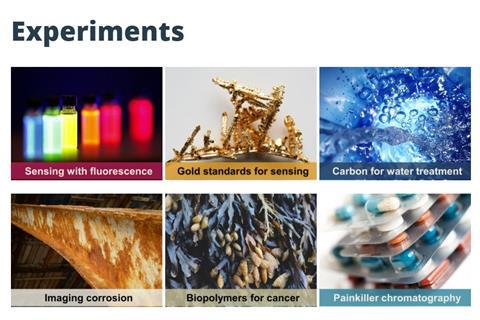A new resource site from the University of Birmingham
ChemBam contains experiments and resources linked to current research from the chemistry department at the University of Birmingham. The project has been created to expand the public’s understanding and confidence when discussing chemistry. I’m not sure it’s quite ready for an average member of the public, but it’s a really useful resource for educators and those interested in chemistry.
The site has a number of reliable, classroom-ready experiments that expand our current repertoire for GCSE and A-level teaching. I love that they are all linked to current research or include ideas relevant to industry. They are ideal for stretching and challenging the more advanced students in your class.
The website is in its infancy and even in the short time I’ve been reviewing it new material has appeared. There are a number of especially useful sections: experiments, definitions, techniques, meet the scientists, and a very cool (if currently small) image bank.
Resources come with some much-needed scientific background information, videos, student questions, teacher guides, technician notes and class activity sheets as pdfs (although I usually prefer them in a format I can edit to suit my classes). Most of the resources seem to be experiments. Each one is new, fresh and offers an insight into chemical research. Each one is new, fresh and offers an insight into chemical research. Examples include: comparing the ability of activated carbon and charcoal carbon to remove pollutants from water; and observing ions exchanging from solution into the zeolite cavities of molecular sieves to demonstrate radioactive waste filtration.
The STEM activities are well presented and ready for the classroom. Although they are fairly standard science club activities, each incorporates chemical research or industrial contexts. The techniques pages look at a wide range of instrumental techniques, going well beyond the theoretical knowledge required for A-level. For me, these miss some actual spectra or worked examples. However, combine them with something like Spectra School (rsc.li/spectraschool) and the problem is solved.
I’m interested to see what ChemBam produces next. To have cutting edge research married with excellent classroom materials along with all the required resources makes me eager to see the site filled with more material in the future.
chembam.com







No comments yet